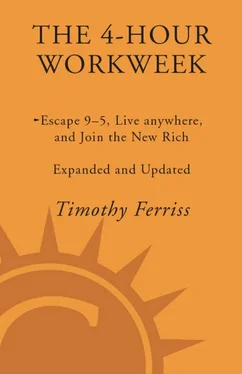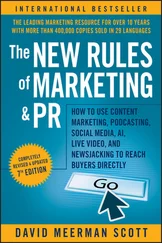Timothy Ferriss - The 4-Hour Workweek - Escape 9–5, Live Anywhere, and Join the New Rich - Expanded and Updated
Здесь есть возможность читать онлайн «Timothy Ferriss - The 4-Hour Workweek - Escape 9–5, Live Anywhere, and Join the New Rich - Expanded and Updated» весь текст электронной книги совершенно бесплатно (целиком полную версию без сокращений). В некоторых случаях можно слушать аудио, скачать через торрент в формате fb2 и присутствует краткое содержание. Жанр: Прочая научная литература, на английском языке. Описание произведения, (предисловие) а так же отзывы посетителей доступны на портале библиотеки ЛибКат.
- Название:The 4-Hour Workweek: Escape 9–5, Live Anywhere, and Join the New Rich - Expanded and Updated
- Автор:
- Жанр:
- Год:неизвестен
- ISBN:нет данных
- Рейтинг книги:3 / 5. Голосов: 1
-
Избранное:Добавить в избранное
- Отзывы:
-
Ваша оценка:
- 60
- 1
- 2
- 3
- 4
- 5
The 4-Hour Workweek: Escape 9–5, Live Anywhere, and Join the New Rich - Expanded and Updated: краткое содержание, описание и аннотация
Предлагаем к чтению аннотацию, описание, краткое содержание или предисловие (зависит от того, что написал сам автор книги «The 4-Hour Workweek: Escape 9–5, Live Anywhere, and Join the New Rich - Expanded and Updated»). Если вы не нашли необходимую информацию о книге — напишите в комментариях, мы постараемся отыскать её.
The 4-Hour Workweek: Escape 9–5, Live Anywhere, and Join the New Rich - Expanded and Updated — читать онлайн бесплатно полную книгу (весь текст) целиком
Ниже представлен текст книги, разбитый по страницам. Система сохранения места последней прочитанной страницы, позволяет с удобством читать онлайн бесплатно книгу «The 4-Hour Workweek: Escape 9–5, Live Anywhere, and Join the New Rich - Expanded and Updated», без необходимости каждый раз заново искать на чём Вы остановились. Поставьте закладку, и сможете в любой момент перейти на страницу, на которой закончили чтение.
Интервал:
Закладка:
Don’t confuse what should be results-driven with routine (e.g., exercise) with something enjoyment-driven that benefits from variation (e.g., recreation).
6. Regret is past-tense decision making. Eliminate complaining to minimize regret.
Condition yourself to notice complaints and stop making them with a simple program like the “21-day no-complaint experiment” made famous by Will Bowen, where you wear a single bracelet and move it from one wrist to the other each time you complain. The goal is 21 days without complaining and you reset to 0 each time you slip up. This increased awareness helps prevent useless past-tense deliberation and negative emotions that improve nothing but deplete your attention.

DECISION-MAKING ISN’T to be avoided—that’s not the problem. Look at a good CEO or top corporate performer and you’ll see a high volume of decisions.
It’s deliberation—the time we vacillate over and consider each decision—that’s the attention consumer. Total deliberation time, not the number of decisions, determines your attention bank account balance (or debt).
Let’s assume you pay 10% over time by following the above rules but cut your average “decision cycle” time by an average of 40% (10 minutes reduced to 6 minutes, for example). Not only will you have much more time and attention to spend on revenue-generating activities, but you’ll get greater enjoyment from what you have and experience. Consider that 10% additional cost as an investment and part of your “ideal lifestyle tax,” but not as a loss.
Embrace the choice-minimal lifestyle. It’s a subtle and under-exploited philosophical tool that produces dramatic increases in both output and satisfaction, all with less overwhelm.
Make testing a few of the principles the first of many fast and reversible decisions. —FEBRUARY 6, 2008
The Not-to-Do List: 9 Habits to Stop Now
“Not-to-do” lists are often more effective than to-do lists for upgrading performance.
The reason is simple: What you don’t do determines what you can do.
Here are nine stressful and common habits that entrepreneurs and office workers should strive to eliminate. The bullets are followed by more detailed descriptions. Focus on one or two at a time, just as you would with high-priority to-do items.
1. Do not answer calls from unrecognized phone numbers.
Feel free to surprise others, but don’t be surprised. It just results in unwanted interruption or poor negotiating positions. Let it go to voicemail, and consider using a service like GrandCentral (you can listen to people leaving voicemail or receive them as text messages) or Phonetag.com (receive voicemails as e-mail).
2. Do not e-mail first thing in the morning or last thing at night.
The former scrambles your priorities and plans for the day, and the latter just gives you insomnia. E-mail can wait until 10 A.M., after you’ve completed at least one of your critical to-do items.
3. Do not agree to meetings or calls with no clear agenda or end time.
If the desired outcome is defined clearly with a stated objective and agenda listing topics/questions to cover, no meeting or call should last more than 30 minutes. Request them in advance so you “can best prepare and make good use of the time together.”
4. Do not let people ramble.
Forget “How’s it going?” when someone calls you. Stick with “What’s up?” or “I’m in the middle of getting something out, but what’s going on?” A big part of GTD (Getting Things Done) is GTP—Getting To the Point.
5. Do not check e-mail constantly—“batch” and check at set times only.
I belabor this point enough. Get off the cocaine pellet dispenser and focus on execution of your top to-do’s instead of responding to manufactured emergencies. Set up a strategic autoresponder and check twice or thrice daily.
6. Do not over-communicate with low-profit, high-maintenance customers.
There is no sure path to success, but the surest path to failure is trying to please everyone. Do an 80/20 analysis of your customer base in two ways—which 20% are producing 80%+ of my profit, and which 20% are consuming 80%+ of my time? Then put the loudest and least productive on autopilot by citing a change in company policies. Send them an e-mail with new rules as bullet points: number of permissible phone calls, e-mail response time, minimum orders, etc. Offer to point them to another provider if they aren’t able to adopt the new policies.
7. Do not work more to fix overwhelmingness—prioritize.
If you don’t prioritize, everything seems urgent and important. If you define the single most important task for each day, almost nothing seems urgent or important. Oftentimes, it’s just a matter of letting little bad things happen (return a phone call late and apologize, pay a small late fee, lose an unreasonable customer, etc.) to get the big important things done. The answer to overwhelmingness is not spinning more plates—or doing more—it’s defining the few things that can really fundamentally change your business and life.
8. Do not carry a cell phone or Crackberry 24/7.
Take at least one day off of digital leashes per week. Turn them off or, better still, leave them in the garage or in the car. I do this on at least Saturday, and I recommend you leave the phone at home if you go out for dinner. So what if you return a phone call an hour later or the next morning? As one reader put it to a miffed co-worker who worked 24/7 and expected the same: “I’m not the president of the U.S. No one should need me at 8 P.M. at night. OK, you didn’t get a hold of me. But what bad happened?” The answer? Nothing.
9. Do not expect work to fill a void that non-work relationships and activities should.
Work is not all of life. Your co-workers shouldn’t be your only friends. Schedule life and defend it just as you would an important business meeting. Never tell yourself “I’ll just get it done this weekend.” Review Parkinson’s Law and force yourself to cram within tight hours so your per-hour productivity doesn’t fall through the floor. Focus, get the critical few done, and get out. E-mailing all weekend is no way to spend the little time you have on this planet.
It’s hip to focus on getting things done, but it’s only possible once we remove the constant static and distraction. If you have trouble deciding what to do, just focus on not doing. Different means, same end. —AUGUST 16, 2007
The Margin Manifesto: 11 Tenets for Reaching (or Doubling) Profitability in 3 Months
Profitability often requires better rules and speed, not more time. The financial goal of a start-up should be simple: profit in the least time with the least effort. Not more customers, not more revenue, not more offices or more employees. More profit.
Based on my interviews with high-performing (using profit-per-employee metrics) CEOs in more than a dozen countries, here are the 11 basic tenets of the “Margin Manifesto” … a return-to-basics call that gives permission to do the uncommon to achieve the uncommon: consistent profitability, or doubling of it, in three months or less.
I review the following principles whenever facing operational overwhelmingness or declining/stagnating profits. Hope you find them useful.
1. Niche Is the New Big—The Lavish Dwarf Entertainment Rule
Several years ago, an investment banker was jailed for trade violations. He was caught partly due to his lavish parties on yachts, often featuring hired dwarves. The owner of the dwarf rental company, Danny Black, was quoted in the Wall Street Journal as saying “Some people are just into lavish dwarf entertainment.” Niche is the new big. But here’s the secret: It’s possible to niche market and mass sell. iPod commercials don’t feature dancing 50-year-olds, they feature hip and fit 20- and 30-somethings, but everyone and his grandmother wants to feel youthful and hip, so they strap on Nanos and call themselves Apple converts. Who you portray in your marketing isn’t necessarily the only demographic who buys your product—it’s often the demographic that most people want to identify with or belong to. The target isn’t the market. No one aspires to be the bland average, so don’t water down messaging to appeal to everyone—it will end up appealing to no one.
Читать дальшеИнтервал:
Закладка:
Похожие книги на «The 4-Hour Workweek: Escape 9–5, Live Anywhere, and Join the New Rich - Expanded and Updated»
Представляем Вашему вниманию похожие книги на «The 4-Hour Workweek: Escape 9–5, Live Anywhere, and Join the New Rich - Expanded and Updated» списком для выбора. Мы отобрали схожую по названию и смыслу литературу в надежде предоставить читателям больше вариантов отыскать новые, интересные, ещё непрочитанные произведения.
Обсуждение, отзывы о книге «The 4-Hour Workweek: Escape 9–5, Live Anywhere, and Join the New Rich - Expanded and Updated» и просто собственные мнения читателей. Оставьте ваши комментарии, напишите, что Вы думаете о произведении, его смысле или главных героях. Укажите что конкретно понравилось, а что нет, и почему Вы так считаете.












